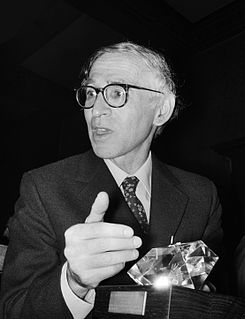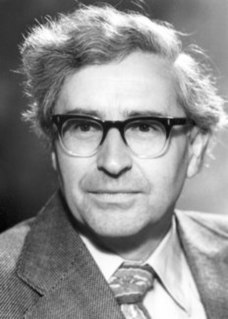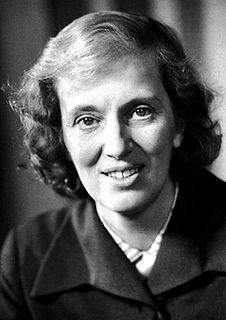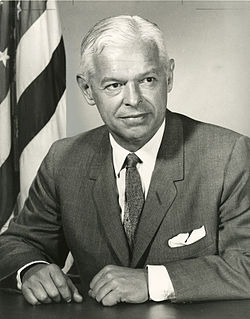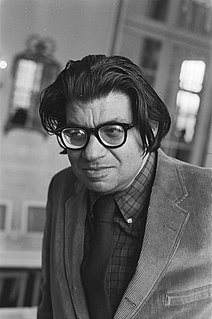A Quote by Martin Ryle
In 1945 J.A. Ratcliffe ... suggested that I [join his group at Cavendish Laboratory, Cambridge] to start an investigation of the radio emission from the Sun, which had recently been discovered accidentally with radar equipment. ... [B]oth Ratcliffe and Sir Lawrence Bragg, then Cavendish Professor, gave enormous support and encouragement to me. Bragg's own work on X-ray crystallography involved techniques very similar to those we were developing for "aperture synthesis", and he always showed a delighted interest in the way our work progressed.
Quote Topics
Accidentally
Always
Aperture
Been
Cambridge
Delighted
Developing
Discovered
Emission
Encouragement
Enormous
Equipment
Gave
Group
Had
His
Interest
Investigation
Involved
Join
Laboratory
Lawrence
Me
Our
Own
Professor
Radar
Radio
Ray
Recently
Similar
Sir
Start
Suggested
Sun
Support
Support And Encouragement
Synthesis
Techniques
Then
Those
Very
Way
Were
Which
Work
Related Quotes
In my own field, x-ray crystallography, we used to work out the structure of minerals by various dodges which we never bothered to write down, we just used them. Then Linus Pauling came along to the laboratory, saw what we were doing and wrote out what we now call Pauling's Rules. We had all been using Pauling's Rules for about three or four years before Pauling told us what the rules were.
Cavendish was a great Man with extraordinary singularities-His voice was squeaking his manner nervous He was afraid of strangers & seemed when embarrassed to articulate with difficulty-He wore the costume of our grandfathers. Was enormously rich but made no use of his wealth... He Cavendish lived latterly the life of a solitary, came to the Club dinner & to the Royal Society: but received nobody at his home. He was acute sagacious & profound & I think the most accomplished British Philosopher of his time.
Some months ago we discovered that certain light elements emit positrons under the action of alpha particles. Our latest experiments have shown a very striking fact: when an aluminium foil is irradiated on a polonium preparation [alpha ray emitter], the emission of positrons does not cease immediately when the active preparation is removed: the foil remains radioactive and the emission of radiation decays exponentially as for an ordinary radio-element. We observed the same phenomenon with boron and magnesium.
His [Henry Cavendish's] Theory of the Universe seems to have been, that it consisted solely of a multitude of objects which could be weighed, numbered, and measured; and the vocation to which he considered himself called was, to weigh, number and measure as many of those objects as his allotted three-score years and ten would permit. This conviction biased all his doings, alike his great scientific enterprises, and the petty details of his daily life.
I think she [Rosalind Franklin] was a good experimentalist but certainly not of the first rank. She was simply not in the same class as Eigen or Bragg or Pauling, nor was she as good as Dorothy Hodgkin. She did not even select DNA to study. It was given to her. Her theoretical crystallography was very average.
When I Asked God for Strength He Gave Me Difficult Situations to Face When I Asked God for Brain & Brawn He Gave Me Puzzles in Life to Solve When I Asked God for Happiness He Showed Me Some Unhappy People When I Asked God for Wealth He Showed Me How to Work Hard When I Asked God for Favors He Showed Me Opportunities to Work Hard When I Asked God for Peace He Showed Me How to Help Others God Gave Me Nothing I Wanted He Gave Me Everything I Needed.
The Clinton investigation was a completed investigation that the FBI had been deeply involved in, so I had an opportunity to understand all the facts and apply those facts against the law as I understood them. This investigation was under way - still going when I was fired. So it's nowhere near in the same place.
Based on a detailed investigation of all the facts and supported by the testimony of the surviving Japanese leaders involved, it is the Survey's opinion that certainly prior to 31 December 1945 and in all probability prior to 1 November 1945, Japan would have surrendered even if the atomic bombs had not been dropped, even if Russia had not entered the war, and even if no invasion had been planned or contemplated.
I have a very dear friend, a great painter, called me up very upset, the work wasn’t going well… He asked me to come to his studio -- which I did -- I looked around at the work, dozens of sketches, drawings, large pictures, and I was very close to his work, intensely involved with his work, and he asked me, ‘What’s wrong?’ And I said, ‘Simple – it’s a loss of nerve.

